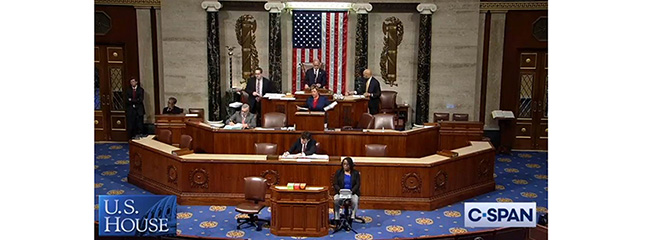
MBA, Trade Groups Support ‘Tough Legacy’ LIBOR Draft Legislation

(House of Representatives session from Mar. 27, 2021, courtesy C-SPAN.)
The Mortgage Bankers Association and nearly 20 other industry trade associations sent a letter this week to House Financial Services Committee leadership in support of draft legislation that would address “tough legacy” contracts that use the London Inter-Bank Offered Rate, or LIBOR.
The April 14 letter supports draft legislation created by the Alternative Reference Rates Committee that would replace ineffective LIBOR-based fallback provisions with recommended fallbacks that will take effect when LIBOR ceases publication; create a safe harbor from litigation for parties that choose ARRC-recommended rates; and not affect contracts that have effective fallbacks that do not reference LIBOR. Legislation based on the ARRC proposal was recently implemented in New York.
“There are trillions of dollars of outstanding contracts, securities and loans that use LIBOR for their interest rates but do not have appropriate contractual language to address a permanent cessation of U.S. dollar LIBOR, which will occur in June 2023,” the letter said. “Existing interest rate fallback provisions may not address the issue at all, may result in adjustable-rate contracts becoming fixed-rate contracts based on the last known LIBOR or may defer to a party’s judgement to replace LIBOR with a comparable interest rate index. In any case, it is likely that ineffective or ambiguous fallback provisions will result in uncertainty, litigation, and harm to consumers, businesses and investors.”
The trade groups said federal legislation is critical and necessary to solve this problem. “Only federal legislation can uniformly address all 50 states, and only federal legislation can address issues such as the need for narrow relief from certain federal laws,” the letter said.
The letter said federal legislation would have a number of benefits to consumers, businesses and investors:
• All parties will have certainty about the outcome of the LIBOR transition. Investors, borrowers, and consumers will not be left to wonder what is going to happen when LIBOR ends, and will be able to plan ahead accordingly.
• All parties will have the same outcome. Investors, borrowers, and consumers will be treated the same as their counterparts and peers. This would not be achieved with a patchwork of inconsistent, or non-existent state legislation. In the absence of federal legislation, one consumer could get a perceived better outcome than their neighbor.
• The legislation will avoid litigation gridlock. In the absence of federal legislation, we expect that thousands of lawsuits would occur. Without action, issuers, investors, and consumers may face years of uncertainty and cost due to litigation.
• Market stability and liquidity will be preserved. In the absence of legislation, it could reasonably be expected that transactions subject to disputes could see a decrease in value (or an increase in value), creating uncertainty that would cause a liquidity to suffer and volatility to increase.
The letter urged the Committee to support such legislation.
Joining MBA in the letter: The Securities Industry and Financial Markets Association; Structured Finance Association; The Financial Services Forum; Consumer Bankers Association; Student Loan Servicing Alliance; Commercial Real Estate Finance Council; The Loan Syndications and Trading Association; Bank Policy Institute; The International Swaps and Derivatives Association; The Real Estate Roundtable; Government Finance Officers Association; Investment Company Institute; Housing Policy Council; Education Finance Council; The American Council of Life Insurers; Institute of International Bankers; and the American Bankers Association.
